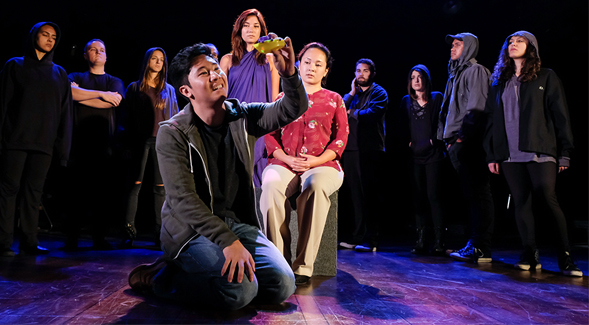An Epic Odyssey Reimagined
The theatre production explores the refugee experience through a classical lens.

The play compares Odysseus’ long journey to that of a modern day refugee—both having to overcome immeasurable obstacles along the way. Randy Reinholz, director of "Anon(ymous)," describes the play as “both modern and ancient in the same moment,” and explains the similarities between the epic poem and "Anon(ymous)."
“Iizuka replaces the main character Odysseus, the Grecian war hero who journeyed home for ten years, with a young refugee looking for home in a new land in modern times,” Reinholz said. “Trucks and trains replace the ships of Odysseus. The monsters come right from the headlines of today’s news stories.”
Anon(ymous) was originally commissioned by the Children’s Theatre of Minneapolis, yet confronts adult issues like sweat shop workers and attempted enslavement, among others.
“There are exquisitely paced moments of tenderness, romance, and beauty,” says Reinholz. “The sweet parts of the play balance the savage reality faced by refugees in first world countries today.”
A timely political issue
Although written in 2006, Iizuka’s script is more relevant than ever in today’s political climate. In a 2007 interview with American Theatre Magazine, Iizuka was asked about how much of the play was influenced by the times in which she was writing it. She responded, “I want very much for the play to speak to our times—and these are times that have been particularly harsh and unforgiving to refugees and recent immigrants. I hope the play begins to honor some of their experiences and stories.”Reinholz recently echoed Iizuka’s sentiments.
“Most important about 'Anon(ymous)' is that it is a beautiful text,” Reinholz said. “It is poetic and soulful, while depicting the best of humanity and the generosity shown in an all too often cruel world.”
"Anon(ymous)" will run Sept. 29 through Oct. 8 in SDSU’s Experimental Theatre. To purchase tickets, visit the SDSU School of Theatre, Television, and Film website.



